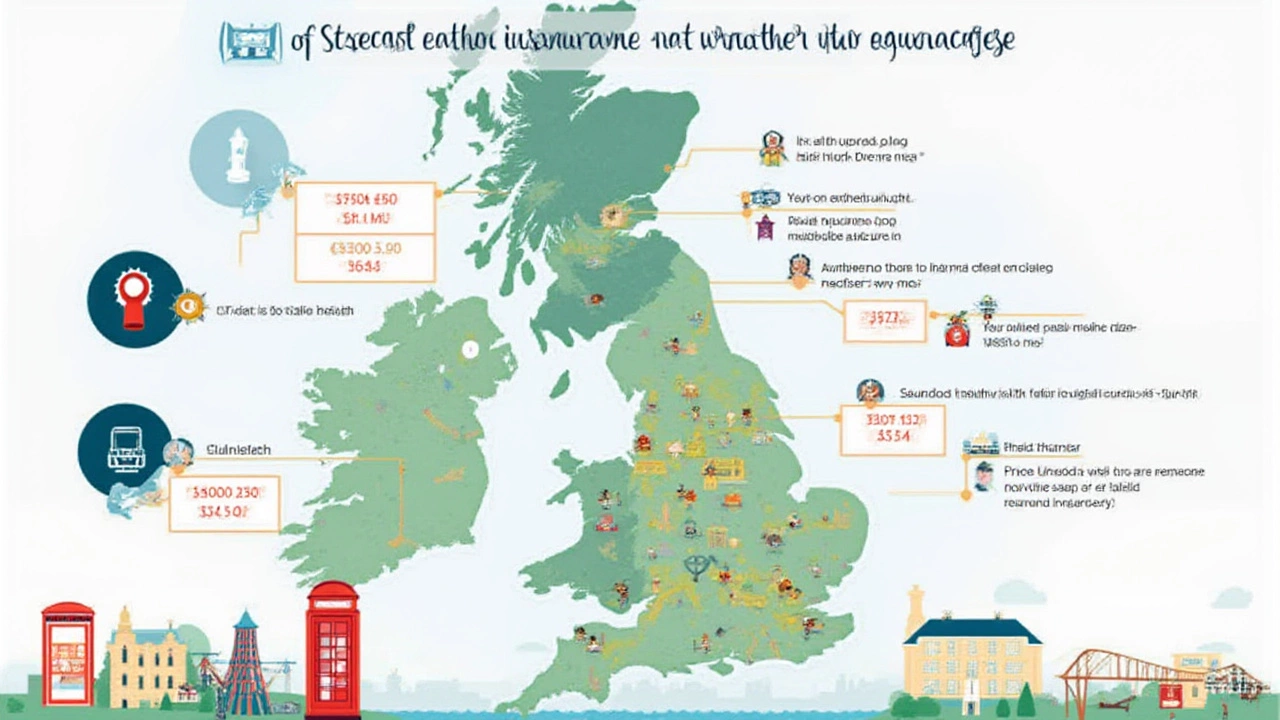 Jul, 30 2025
Jul, 30 2025
Picture this: you need surgery or a specialist fast, but the NHS waiting list stretches out for months. No one wants to stress over health problems longer than necessary. That’s why so many people in the UK are searching for private health insurance—even though it means shelling out a monthly sum. But how much does that actually cost these days? Spoiler: the answer’s not as simple as some glossy brochures want you to think.
Prices can swing wildly, and what you pay isn’t just about your age or health. Insurers mix in a cocktail of factors, from where you live to how much coverage you want. If you’re single, relatively healthy, and living outside London, your monthly price might be lower than your mobile bill. But add in partners, kids, or an appetite for gold-plated perks, and your monthly cost can rocket faster than train fares. It all comes down to what kind of safety net you want beneath you.
What Does Private Health Insurance Actually Cover?
You may have seen flashy ads promising private rooms and fancy treatments, but not all health insurance is built the same. At its core, private medical cover takes care of the cost of private consultations, diagnostics, and treatments that might otherwise mean a nail-biting wait on the NHS. You can use it for things like cancer care, mental health, physiotherapy, and more—or just for hospital stays. Most policies skip out on things like A&E, chronic condition management, maternity, and standard GP visits, so it’s wise to know what’s actually included before you hit “buy.”
There’s a big difference between basic and premium policies. A starter plan might only cover inpatient treatment, like when you need surgery and have to stay in hospital. Add outpatient cover—think tests, scans, and specialist visits—and your monthly price can almost double. Want mental health support, dental, or worldwide cover? Every extra bumps up the bill. Some policies even offer wellness extras, like annual health MOTs, gym discounts, or virtual GP services, but these usually nudge the monthly premium higher.
Insurers love optional extras: zero-excess claims, coverage for experimental drugs, private ambulances, and even coverage for alternative therapies. These can all make a real difference if you use them—but, as you might guess, every add-on costs a bit more each month. It’s easy to get excited about upgrades, but if you rarely see a doctor, you could be paying for perks you never touch.
Most policies come with a yearly or per-claim excess—a set amount you pay before insurance kicks in. Setting your excess higher can shrink your premium. Still, you’ll want to balance the monthly savings with the risk of a big bill if you actually use your cover. The insurance market calls this “cost sharing,” but for you, it’s about budget and peace of mind.
How Much Is Private Health Insurance in the UK Per Month?
This is the question everyone’s desperate to answer, but spoiler alert: there’s no one-size-fits-all sticker price. For a healthy adult in their 30s, basic private health insurance in the UK can start as low as £35 to £50 per month in 2025. But let’s get real—most people end up paying a bit more. If you add outpatient cover and mental health support, it’s common to see quotes in the range of £65 to £120 monthly. If you’re over 50, have a couple of kids on the policy, and want comprehensive cover, monthly costs often jump above £200, sometimes topping £400 for families in cities like London.
Here’s a snapshot of typical monthly prices in the UK for 2025, based on public data from insurance sites and brokers:
| Person/Family | Location | Type of Cover | Average Monthly Cost (£) |
|---|---|---|---|
| Single, age 30 | Manchester | Basic inpatient only | 40 |
| Single, age 40 | Bristol | Inpatient + outpatient | 75 |
| Couple, both 50 | Birmingham | Comprehensive | 190 |
| Family (2 adults, 2 kids) | London | Premium, no excess | 395 |
Note how much location matters—London can easily add 30% or more compared to smaller cities. Age also plays a massive part. Every decade adds cost, sometimes disproportionately so. Want to keep things affordable? Play around with excesses, or check if your employer offers group cover. Comparing insurers every couple of years pays off: prices can drift upward with automatic renewals, but new customers snag juicy discounts or extra perks.
Also, most policies increase your premium as you age—even if you never claim a penny. This is called “age-banded” pricing, and it’s one of the main reasons people see their bills tick upward over time. Health changes, claims history, and even major market shifts (hello, inflation) can also drive up renewal quotes. Don’t just accept a big hike—shop around, challenge your renewal, and ask about loyalty rewards or switching deals.

Tips That Could Save You a Packet
Trickiest part about private health insurance? It’s easy to pay for cover you’ll never use, but skimping too much may leave you fuming later on. Here’s a handful of tips that’ve helped people strike the right balance:
- If you’re young and healthy, start with a basic policy. You can always upgrade next year if your circumstances change. There’s no medal for overinsuring yourself.
- Increase your excess. Setting a £250 or £500 excess could knock 10-30% off your monthly bill. Not keen to pay so much at claim time? Settle on a compromise—maybe a £100 excess for a good middle ground.
- Skip overseas cover unless you travel a lot. European and global policies cost more—no point unless you really need them.
- If you have a partner or kids, buy a joint or family plan rather than individual ones. Insurers usually give a discount for bundling everyone together.
- Ask about “guided consultant lists.” Some providers charge less if you agree to choose specialists from their shortlist, rather than getting a free-for-all pick. Narrower network, but noticeably cheaper.
- Review your cover every year. If your insurer jacks up your rate after a quiet year, threaten to switch—you’d be amazed what they’ll offer to keep you on board.
- Don’t let loyalty cost you. Most insurers reserve the best prices for new customers. Get a quote as if you’re new, then use it to haggle with your current provider.
- Check out workplace health insurance. Group schemes from employers tend to be cheaper, with broader cover and less fuss about pre-existing conditions.
One underrated trick? Use comparison sites, but dig deeper than the first price you see. Sometimes the cheapest headline number has sneaky limits—low inpatient days, tight mental health caps, or tiny outpatient spending. Take time to read the exclusions, and consider calling brokers; they often know about corporate rates or hidden deals the public never sees.
What Affects Your Private Health Insurance Cost?
By now, it’s pretty obvious there’s way more to your premium than ticking a few boxes. Insurers factor in almost everything, so let’s break down what tips the scales the most.
- private health insurance UK: Your age is probably the biggest factor. The older you get, the higher your chances of needing treatment, and the pricier your premium. Sometimes just turning a landmark age (50, 60, 70) can trigger a chunky rise.
- Medical history can trip you up, too. Recent or ongoing health issues bump up costs, or even trigger exclusions. That’s why younger folks snag such cheap rates—their risk is lower, at least on paper.
- Your postcode matters more than you’d expect. London and the South East come with bigger price tags than rural areas. Hospitals charge more, and private clinics are busier, so insurers pass on the cost.
- The coverage type you choose sets the baseline. Inpatient-only (just hospital stays) is cheapest, while comprehensive (including outpatient, cancer, mental health, and extras) can more than double the cost.
- Family size is another lever. Adding kids is often affordable—sometimes free until their teens—but partners and older dependents raise the cost sharply.
- Your chosen excess (how much you pay before insurance does). Go for a higher excess and your monthly premium drops. Go for zero and you’ll pay top whack.
- Smoker status still counts. Not as much as life insurance, but a regular smoker will pay noticeably more than a non-smoker. Some providers ask for proof.
One myth worth busting: your job rarely affects your premium with standard insurers unless you work a high-risk occupation (like extreme sports instructor or stuntman). For most, your profession is just a boring data point. However, employers who provide group cover often get much sweeter deals, since the risk spreads across a bigger pool.
As for paying monthly or yearly, most insurers let you split the cost however suits you. Paying annually saves a little, but if you’d rather keep your cash handy, monthly is the UK norm.
Under the hood, private health insurance isn’t about buying peace of mind at any cost. It’s about matching what you pay with what you need—nothing more, nothing less. That means shopping carefully, staying flexible, and not being shy when it comes to haggling for a better deal once renewal season comes around.
